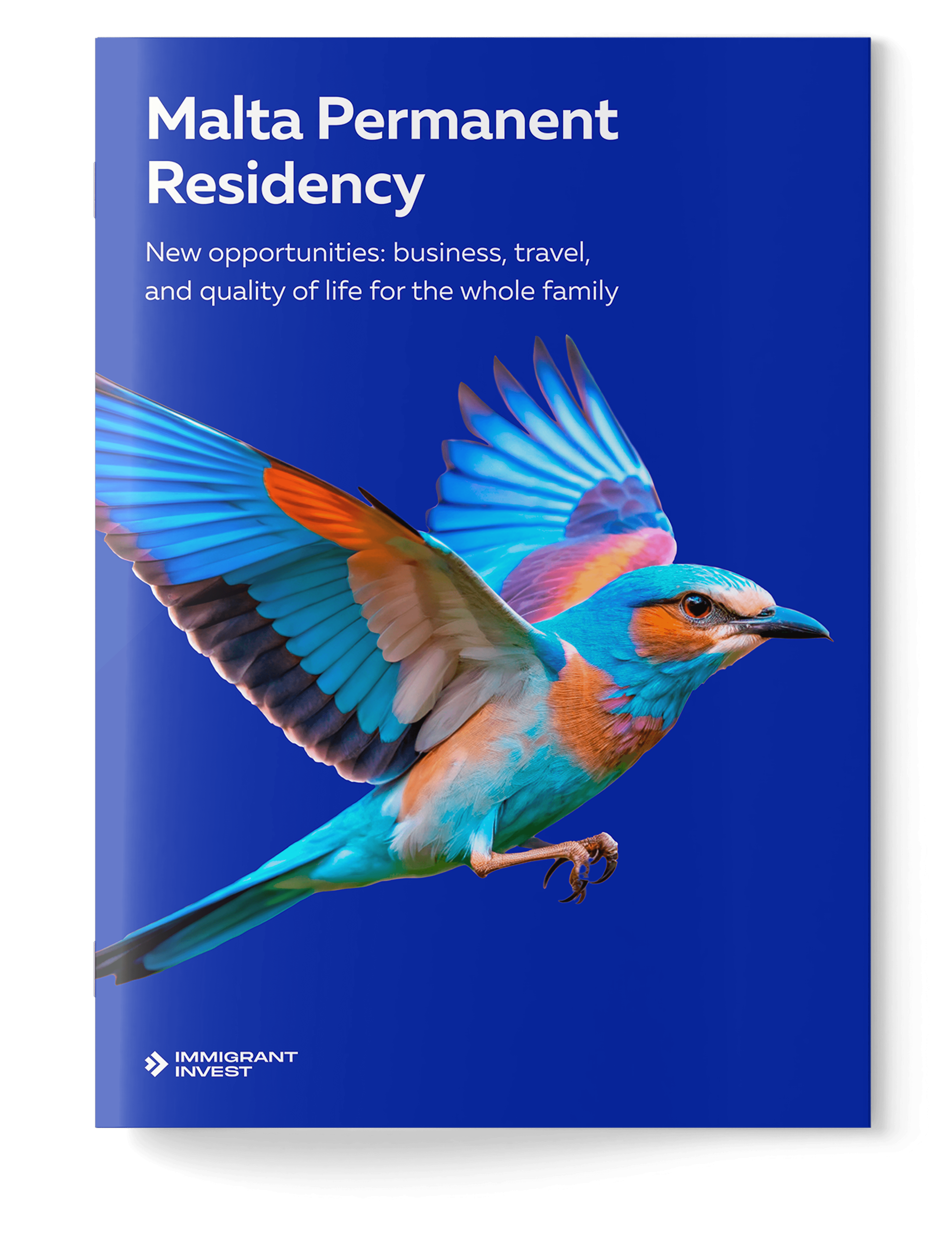Summary
The cost of living in Malta island is lower than in Austria and other West European countries. Most foreigners who move to Malta note that the average monthly expenses are about €1,600 per person.
Some of our clients recently moved to Malta. In this article, we explore prices and our clients’ experience of living on the island.
General price level in Malta
Malta has an average European level of prices on goods and services. However, living in Malta is cheaper than in Central and North European countries. For example, a single person in the Netherlands needs about €2,100 a month, while in Malta, this sum is about €1,600.
Property in Malta is also quite cheap compared to Europe. For example, a square metre of an apartment in a city in Sweden costs €5,165, while in Malta, a square metre is around €3,630. German residents pay about €300 for basic utilities, while Maltese residents pay €90.
Affordable living costs make Malta an attractive place for those seeking residency. Investors can obtain Malta permanent residency, which grants the right to live in the country indefinitely.
Monthly budget for living in Malta
Living expenses in Malta are higher than in East European countries and lower than in Central and North European states.
The most significant expense is the rent on housing, which might reach €1,600 per month. If you own housing, €2,700 per month will be enough for a family of four.
Cost of a month of living in Malta
Cost of living per month in Malta compared to the US
In general, living in Malta is cheaper than in the United States. One of the most expensive things is rent, which is almost 2 times higher in the United States.
Another point is healthcare: while American citizens need to pay a decent sum to get treatment in the US, Maltese citizens benefit from free public healthcare and health insurance.
Comparison of monthly expenses in Malta and the USA
Prices on renting a property in Malta
Obtaining residency or citizenship requires investors to rent or buy a residential property in Malta. The following price thresholds must be met in the rent case:
- €8,750+ per year if a property is located in the South of Malta or Gozo or €9,600+ per year in other regions to get a residence permit through the Malta Global Residence Programme;
- €14,000 per year for five years to participate in the Malta Permanent Residence Programme;
- €16,000+ per year for five years after obtaining citizenship by naturalisation for exceptional services.
The opportunity to obtain Malta citizenship by naturalisation for exceptional services has been cancelled. Applicants with genuine ties to the country, whose professional, economic, or social contribution serves Malta’s national interest, can now obtain Malta citizenship by merit.

Andrew S.,
Opened a real estate agency in Malta, an Immigrant Invest client
The most expensive rent is in tourist centres like Sliema and St Julian’s. A small one-room apartment costs €950—960 per month, and the price for more comfortable apartments starts at €1,400 per month.
I recommend moving a bit further from the city centre and renting an apartment or a house there. Malta is a small island, and everything is close to each other. You can get anywhere in 15 minutes. Therefore, you won’t miss anything and will be able to rent housing profitably.
For €1,600 a month, you can rent great spacious apartments with 3 bedrooms. The utility bills will be €80—150.
Prices on buying property in Malta
The price per square metre of an apartment in the city centre of Malta is around €3,630. Outside the city centre, one might expect to pay €2,815.
For investors obtaining residency or citizenship, the purchase price is defined by a specified threshold as follows:
- €220,000 for the south of Malta or Gozo and €275,000 for other regions under the Global Residence Programme;
- €375,000 in any region under the Malta Permanent Residence programme;
- €700,000 in any region for citizenship for exceptional services by direct investments.
The mandatory ownership period is 5 years. After that, the investor can sell real estate and get a money return.
Prices on groceries in Malta
Expenses on groceries in Malta depend on where to buy goods. In ordinary supermarkets, prices differ from those in other European countries.
Other shops in Malta, like food kiosks, are oriented toward tourists. Prices there are high. In ordinary supermarkets, products can cost 1.5—3 times cheaper.
The average prices of staple food are the following:
-
milk, 1 litre — €1.14;
-
drinking water 1,5 litre — €0.79;
-
12 eggs package — €3.14;
-
loaf of bread, 500 g — €1.15;
-
local cheese, 1 kg — €8.94;
-
chicken fillets, 1 kg — €8.18;
-
beef round, 1 kg — €14.38;
-
rice, 1 kg — €3.02;
-
apples, 1 kg — €2.69;
-
bananas, 1 kg — €1.82;
-
oranges, 1 kg — €2.31;
-
potatoes, 1 kg — €1.73;
-
tomatoes, 1 kg — €2.84;
-
onions, 1 kg — €1.80.
Lunch or dinner in a cafe usually costs around €10—15. The average bill depends on a cafe or restaurant, and Malta has a wide variety of those. For example, the Michelin Guide Malta gives information on 40 restaurants. Seven of them have Michelin stars.

Mary D.,
Obtained Malta permanent residency, an Immigrant Invest client
Locals buy groceries in big supermarket chains such as Lidl or Carrefour. They have reasonable prices and quality products. Farmers sell their products in the food kiosks. I don’t recommend buying food there as everything is way more expensive and the quality is not very different from the products in supermarkets.
Expenses on transportation
Malta’s transportation expenses are not high as the country consists of just a few islands. The biggest island is 27 km long and 15 km wide.
Maltese citizens use buses, ferries and taxis.
Buying a personal car in Malta is easier than moving it from another country. Moreover, car rentals are popular in the country. Rental of low-cost cars starts at €30 per day; for business-class vehicles, you will pay €50—80.
The price of petrol is €1.3 per litre. The standard tariff for a taxi in Malta is €2 per kilometre.
Cost of education in Malta
Prices of kindergartens and schools in Malta depend on the level of educational institutions:
- private kindergartens cost €460—470 per month;
- studying in an international primary school costs €8,200 per year;
- studying in public schools is free.
Education in public schools is usually in Maltese, in addition to English lessons. Some parents choose private and international schools only to teach lessons in English.
Maltese high school diplomas are accepted in all countries of the European Union. Thus the child will have no problem applying to any university in Europe.
Studying at state universities is free for Maltese and EU citizens. The tuition fee for third-country nationals depends on the chosen university and study field. For example, getting a bachelor’s degree in law at the University of Malta costs €8,500 per academic year and a bachelor’s degree in mechanical engineering costs €10,800 for the same period.
Don’t know where to start?
Download our one-page pathways navigator to compare the options and pick the best one
Expenses on healthcare
Maltese citizens and residents own a European Health Insurance Card and have free access to public doctors and hospitals.
Those who choose private healthcare can expect to pay around €20 for an appointment with a general practitioner and about €50—60 for a specialist.
Health insurance costs start at around €100 for a basic plan. The price for a more advanced plan might be up to €200.
Salaries and business profits
The monthly average income in Malta is lower than the average income in the European Union. According to the Labour Force Survey, it is €1,942 per month, while the average income in the EU is €3,155.
Business opportunities also attract investors to Malta. The most promising and lucrative companies in Malta work in the following fields:
-
tourism — car and property rentals, organisation of excursions, hotel business;
-
beauty and health — beauty salons, fitness clubs, massage salons;
-
medical services — Maltese resorts are popular among Europeans who come to undergo health improvement courses;
-
education — Malta has many private schools and branches of international and European universities; people also come to Malta to learn English;
-
high technologies — owners of IT companies often choose Malta for living because of tax breaks and opportunities to quickly find clients and business partners.

Helen A.,
Obtained Malta citizenship in 2016, an Immigrant Invest client
You can create a high-demand business or get a job in a successful company. Then your income will be higher than the average income in Europe.
There are namely business opportunities. people from all over Europe come to Malta for holidays and medical treatment, and tax rates there are lower than in other EU countries. Therefore it is not a problem to achieve a constant income and a comfortable level of life in Malta.
For example, lawyers and economists working in big enterprises have good salaries. However, one needs to have a diploma from a European university.
Other benefits of living in Malta
Climate . Maltese summers are warm, and the average temperature during this period is +25—27°C. Winters are mild, and the temperature rarely goes below 0°C. Malta has around 3,000 sunny hours a year, which makes the country one of the sunniest places in Europe.
Safety. The crime rate in Malta is low. In terms of global rankings, Malta is consistently recognised as one of the safest countries. According to the Legatum Prosperity Index 2023, Malta ranks 17th globally for safety and security out of 167 countries, right above Canada and Germany.
Low taxes. Malta offers attractive tax rates. For example, VAT in Malta is lower than in most EU countries and is 18%, while it is around 23% in EU countries. The income tax rate depends on the salary of the taxpayer. For example, a married person doesn't need to pay income tax if they earn less than €15,000.
There are also no taxes on wealth, gifts, inheritance and, in some cases, property.
Multilingual community. Many people from different regions move to Malta, so there is also a possibility to find locals from a certain country. Moreover, English is the official language in Malta, and almost everyone speaks it.
In summary: everything you need to know about the cost of living in Malta
-
Living in Malta costs around €1,600 per person per month, which is lower than in Central and North European countries.
-
Renting a one-bedroom apartment costs €800—1,600 per month while buying property in city centres starts at €3,630 per square metre.
-
Monthly expenses include €220+ for groceries, €80+ for utilities, and €40+ for transportation.
-
Public healthcare is free, private insurance costs €100—200 per month, and international schools charge €8,200 per year.
-
By purchasing or renting property and meeting financial requirements, investors can obtain a Malta residence permit, permanent residency or citizenship.
-
Malta offers a warm climate, a low crime rate, a favourable tax system, and an English-speaking environment, making it an attractive place to live.
Immigrant Invest is a licensed agent for citizenship and residence by investment programs in the EU, the Caribbean, Asia, and the Middle East. Take advantage of our global 15-year expertise — schedule a meeting with our investment programs experts.










